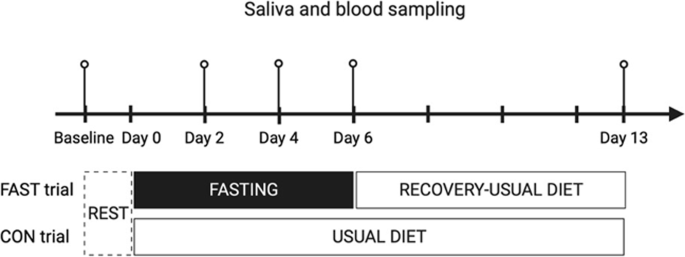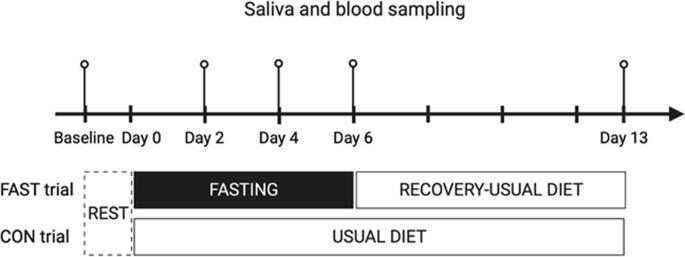探索长期禁食对健康男性体内犬尿氨酸途径代谢物和压力指标的影响。
IF 3.6
3区 医学
Q2 NUTRITION & DIETETICS
引用次数: 0
摘要
背景/目的:长期禁食会引发人体的应激反应。研究对象/方法: 健康男性被分为禁食组(零卡路里限制)和对照组(CON,n = 10),禁食组为期 6 天(FAST,n = 14)。在禁食期间的基线、第 2 天、第 4 天、第 6 天和恢复正常饮食后 1 周采集血液和唾液样本。使用超高效液相色谱-质谱法(UPLC-MS/MS)测量血浆中犬尿氨酸途径代谢物的水平。对血浆和唾液样本进行了压力标记物分析:结果:结果表明,FAST 试验参与者的犬尿氨酸通路被明显激活。吡啶甲酸(PIC)、犬尿氨酸(KYNA)和 3-羟基犬尿氨酸(3-HK)的浓度显著增加,在第 6 天达到峰值(P 结论:FAST 试验的结果表明,犬尿氨酸通路在 FAST 试验中被明显激活:延长禁食 6 天可诱导犬尿氨酸途径,对应激指标的影响极小。正常进食后代谢物浓度的恢复意味着犬尿氨酸途径合成酶在面临干扰时能快速适应以维持体内平衡。本文章由计算机程序翻译,如有差异,请以英文原文为准。


Exploring the effect of prolonged fasting on kynurenine pathway metabolites and stress markers in healthy male individuals
Prolonged fasting triggers a stress response within the human body. Our objective was to investigate the impact of prolonged fasting, in conjunction with stress, on kynurenine pathway metabolites. Healthy males were divided into fasting group (zero-calorie-restriction) for 6 days (FAST, n = 14), and control group (CON, n = 10). Blood and saliva samples were collected at baseline, Day 2, Day 4, Day 6 during fasting period, and 1 week after resuming regular diet. Plasma levels of kynurenine pathway metabolites were measured using ultra-performance liquid chromatography-mass spectrometry (UPLC-MS/MS). Plasma and salivary samples were analyzed for stress markers. A pronounced activation of the kynurenine pathway in individuals on FAST trial was revealed. Concentrations of picolinic acid (PIC), kynurenic acid (KYNA) and 3-hydroxykynurenine (3-HK) were significantly increased, with peak levels observed on Day 6 (P < 0.0001). Conversely, concentrations of tryptophan (TRP) and quinolinic acid (QUIN) decreased (P < 0.0001), while kynurenine (KYN) and nicotinamide (NAM) levels remained stable. Cortisol and noradrenaline concentrations remained unchanged. However, adrenaline levels significantly increased on Day 4 within FAST compared to CON (P = 0.005). Notably, all deviations in kynurenine pathway metabolite levels returned to baseline values upon resuming regular diet following the 6-day fasting regimen, even when weight and BMI parameters were not restored. Extended fasting over 6 days induces the kynurenine pathway and has minimal effects on stress markers. Restoration of metabolite concentrations upon regular feeding implies rapid adaptation of the kynurenine pathway synthetic enzymes to maintain homeostasis when faced with perturbations.
求助全文
通过发布文献求助,成功后即可免费获取论文全文。
去求助
来源期刊
CiteScore
10.60
自引率
2.10%
发文量
189
审稿时长
3-6 weeks
期刊介绍:
The European Journal of Clinical Nutrition (EJCN) is an international, peer-reviewed journal covering all aspects of human and clinical nutrition. The journal welcomes original research, reviews, case reports and brief communications based on clinical, metabolic and epidemiological studies that describe methodologies, mechanisms, associations and benefits of nutritional interventions for clinical disease and health promotion.
Topics of interest include but are not limited to:
Nutrition and Health (including climate and ecological aspects)
Metabolism & Metabolomics
Genomics and personalized strategies in nutrition
Nutrition during the early life cycle
Health issues and nutrition in the elderly
Phenotyping in clinical nutrition
Nutrition in acute and chronic diseases
The double burden of ''malnutrition'': Under-nutrition and Obesity
Prevention of Non Communicable Diseases (NCD)

 求助内容:
求助内容: 应助结果提醒方式:
应助结果提醒方式:


